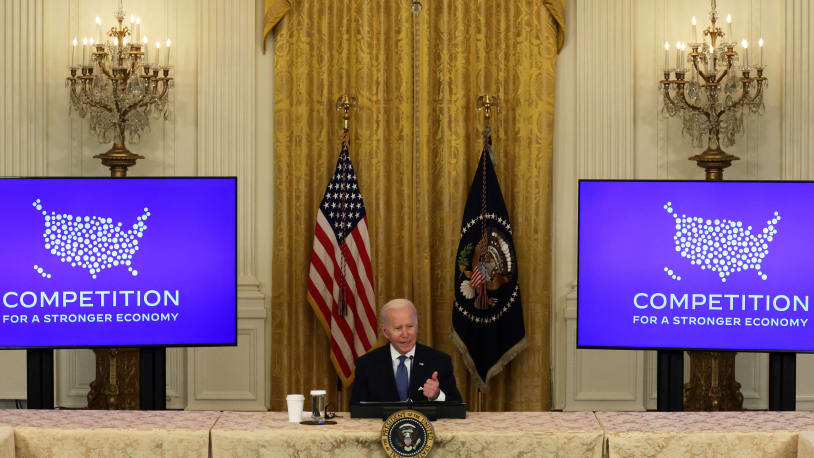
Growth: A banner year, with undercurrents of anxiety
The smartest insight and analysis, from all perspectives, rounded up from around the web:
Despite the ongoing pandemic, strained supply chains, and rising inflation, the U.S. economy grew in 2021 at a pace unmatched in nearly 40 years, said Lucia Mutikani in Reuters. “A surge in gross domestic product in the fourth quarter” represented “the final push” in a banner year that saw 5.7 percent growth from 2020, the biggest jump since 1984. Corporations have also seen strong earnings, with Apple reporting a record quarter. Some economists, however, have cautioned against celebrating the results. “The government provided nearly $6 trillion in pandemic relief,” which has since been phased out. Growth was “lifted by a jump in consumer spending in October before retreating considerably” as the Omicron variant began to spread. Inflation also grew 6.9 percent, “the fastest since the second quarter of 1981.” The Federal Reserve is expected to ratchet up interest rates to combat the rise in prices, a move that risks “bringing the economy crashing back down.”
“Look under the hood” and it’s clear a lot of the growth was driven by businesses, not consumers, said Gary Shilling in Bloomberg. There was “a large buildup in the supply of goods” in the fall, just as retailers began to panic about shortages for the holidays. Without all the inventory buildup, “the economy grew at only a 2 percent annual rate.” Alarmed consumers then “finished most of their buying by Thanksgiving,” and their appetite for spending hasn’t recovered. Now, “getting rid of those excess inventories” will leave a “mirror image of the positive effects of building them.”
The entire debate around the economy is warped, said Paul Waldman in The Washington Post. The GDP numbers are “positively spectacular, exceeding every forecast.” But the perception about the economy falls along party lines. Researchers at the University of Michigan found that “Republicans give lower marks to the economy than they did at the worst points of the Great Recession in 2008 or the pandemic recession in 2020.” That’s absurd. Yes, you can protest that the GDP numbers are somewhat skewed because we were coming out of a recession. “But by that logic, Ronald Reagan and Bill Clinton didn’t deserve any credit for the strong economies when they were president, either.”
“Inflation has complicated the narrative” about a booming economy, said Jeanna Smialek and Ben Casselman in The New York Times, because of how quickly it is eating into the recovery. For instance, “workers are seeing their wages rise at the fastest pace in decades,” but many of them are finding that their paychecks still aren’t going as far as they used to. Our experience of the economy has also become defined by precarity, said Samuel Goldman in The Week. We live in fear that “conditions you count on today will become inaccessible tomorrow,” whether that’s because of getting sick with COVID, or having your child’s school suddenly close, or goods vanishing from store shelves. “The pandemic has widened the gap between our expectations for stability and the reality of daily life.” Until that changes, aggregate GDP statistics “won’t matter very much.”
This article was first published in the latest issue of The Week magazine. If you want to read more like it, you can try six risk-free issues of the magazine here.
The smartest insight and analysis, from all perspectives, rounded up from around the web: Despite the ongoing pandemic, strained supply chains, and rising inflation, the U.S. economy grew in 2021 at a pace unmatched in nearly 40 years, said Lucia Mutikani in Reuters. “A surge in gross domestic product in the fourth quarter” represented “the…
The smartest insight and analysis, from all perspectives, rounded up from around the web: Despite the ongoing pandemic, strained supply chains, and rising inflation, the U.S. economy grew in 2021 at a pace unmatched in nearly 40 years, said Lucia Mutikani in Reuters. “A surge in gross domestic product in the fourth quarter” represented “the…